Bat Mitzvah in Berlin Recalls Holocaust
The bat mitzvah of Chana Sophia Bena Lipis took place in Berlin, at the historic Oranienburger Strasse Synagogue.
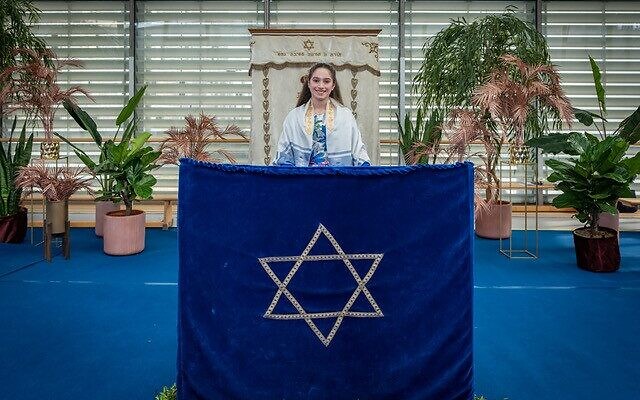
As we walked toward the large and magnificent Oranienburger Strasse Synagogue in Berlin during the last Shabbos in March, I noticed that the front of the shul had three-foot-high barricades set five feet apart around the entrance, with a metal chain connecting them.
Two policemen and a member of the congregation were at the entrance, checking the guests arriving for the bat mitzvah of Chana Sophia Bena Lipis. The front entrance had two bulletproof doors. Visitors had to get through the first, then close it before the second door would open. This morning, both doors were wide open for the hundred-or-so people attending the bat mitzvah service. The doorman had a list of attendants and asked each whether they had been tested for COVID.
The Shabbos service was a traditional service under the auspices of Masorti, the movement for Conservative Judaism in Europe. For Chana’s bat mitzvah, the Lipis family gave 100 regular siddurs in German to anyone attending the service, in honor of her family’s great grandparents: Esther and Max Siegel, Sophie and Leo Lipis, Golda and Josef Aron Kosminski, and Johanna and Arthur Levy.
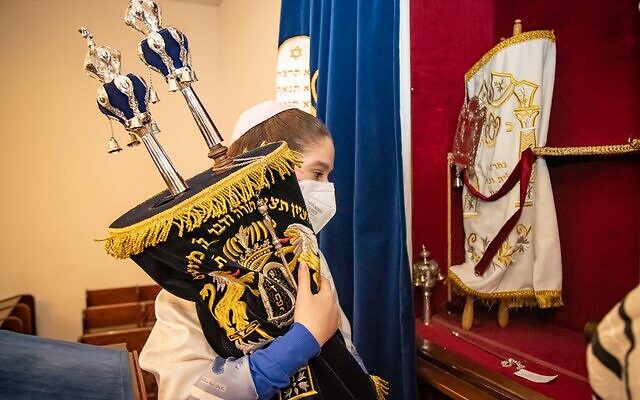
The rabbi of the synagogue, Gesa Ederberg, was the first woman rabbi in Berlin. The cantor was also a woman, with a beautifully trained operatic voice. Some men did not wear a kippah and most women wore a tallis. We sat far apart from each other in chairs, and everyone had to wear a mask.
The Torah service was also quite unusual, compared to that of an orthodox synagogue in Atlanta. There was no order on who was called to the Torah, and women were given aliyot like the men. My daughter, Pamela Glinsky, had the first aliyah.
“For me, I was having my own bat mitzvah,” she said.
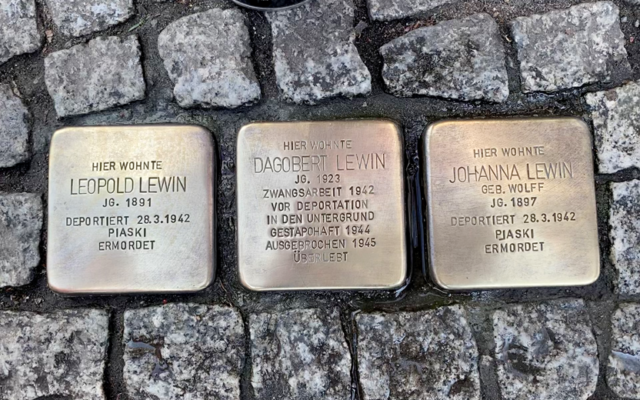
Chana Lipis was well prepared for her own aliyah. She was the first bat mitzvah girl from a Masorti Jewish day school of 50 students — 10 of whom are from Ukraine — that had been established partly by her parents, Mimi and Leo Lipis, and several other Jewish families.
She read from the Torah scroll with ease and recited her parsha as though she had been reading the Torah scroll all her life. Her two brothers led the service, singing Anim Semirot, but the congregation was not asked to sing with them to avoid any issue with COVID. There was only one Torah and it was taken from a traditional ark that was perched on wheels so it could be removed from the theater where the service was held.
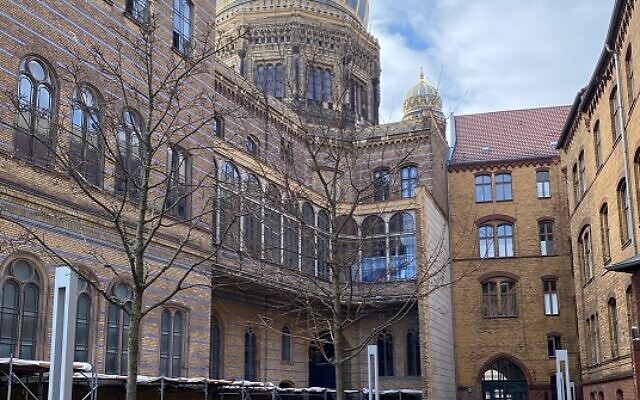
The main sanctuary was destroyed during World War II and had never been rebuilt, even though the remaining building was still very impressive. The only thing left of the main 3,000-seat synagogue was the foundation columns in the open courtyard.
After the service, the kiddush was held in the open courtyard, with everyone receiving a paper bag of food. People ate there or left and took the bag with them. It was a sad commentary on not being able to have a lovely kiddush to celebrate the occasion. It was the price we were paying for COVID.
“Chana’s bat mitzvah was a joyous occasion for the Masorti synagogue in Berlin,” said Rabbi Nils Ederberg, husband of the rabbi, following the service. “With the war going on in Europe and our community hosting 50 refugees from our five Masorti communities in Ukraine, Chana’s bat mitzvah was a reminder of the strength of Jewish life where only some years ago not many would have expected it to flourish.”
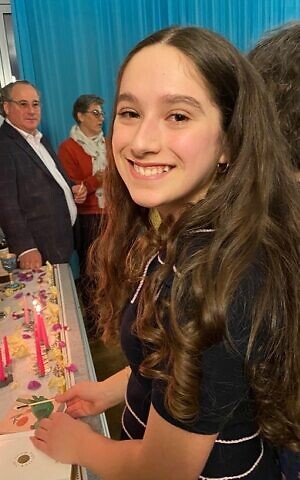
That evening, an exciting party took place at a huge estate in a Berlin suburb with plenty of food, lots of dancing and speeches from the host parents. Chana’s mother, Mimi, asked everyone at the event to write a memorable note to Chana on identical individual pieces of fabric to be sewn together into a collage, and then put into a huge frame for Chana to install somewhere in her home. People wrote in several languages. It was a lovely idea, especially because it was a surprise for Chana.
On Sunday morning, the family held a lovely brunch at their office to say goodbye to those traveling from parts of Germany and from the U.S. In the same way that a bat mitzvah in Atlanta offers events throughout the weekend, this bat mitzvah in Berlin was no exception. It was an especially beautiful occasion since it was my family, and because the family had put off the event for more than a year because of COVID.
On that trip, we did something else that was a huge mitzvah for Bev Lewyn and her family. Lewyn had written a book, “On the Run in Nazi Berlin,” a memoir of her father-in-law, Bert Lewyn (originally Lewin). The German government had installed brass memorial plaques at the exact street locations throughout the country where Jews had been taken from their homes by the Nazis and sent to concentration camps, where many ultimately died. There were thousands of them all around Berlin. Lewyn asked Pamela to find the brass plaques for her father-in-law and his parents and clean them.
We knew the approximate location, and Pamela had made a special effort to buy brass cleaning materials. We drove to the location with six people and walked around the community until we found the plaques. Immediately, several of us felt a strong emotional relief that we could accomplish this mitzvah. Bert Lewyn had survived the Holocaust and published an extremely compelling story of his survival, but his parents did not. For the better part of an hour, Pamela cleaned and polished the three plaques, and when she finished, we all said a prayer right there for the occasion.
It is worth noting that while Berlin had 80 synagogues and 170,000 Jews prior to World War II, today there are 12,000 registered Jews in the city, some 25,000 to 30,000 Jews overall, most of them immigrants from Russia. In Germany, if you register your religion, you pay nine percent of your salary as a church tax, which is given to appropriate religious authorities for various uses. As a result, Jewish day schools are virtually free.
There are also six kosher restaurants and eight synagogues, all protected by the German police at all times. The city is an exciting place for tourists, and there are memorials to the Holocaust in many locations. Ironically, today, Germany is among the safest places for Jews in Europe.
- Simcha Spotlight
- Bat Mitzvah
- Lifecycle
- Lifecycles
- Allen Lipis
- Oranienburger Strasse Synagogue
- Chana Sophia Bena Lipis
- Masorti
- Esther and Max Siegel
- Sophie and Leo Lipis
- Golda and Josef Aron Kosminski
- Johanna and Arthur Levy
- Gesa Ederberg
- Pamela Glinsky
- Aliyah
- Anim Semirot
- World War II
- WWII
- nazis
- Rabbi Nils Ederberg
- Bev Lewyn
- On the Run in Nazi Berlin
- holocaust



comments